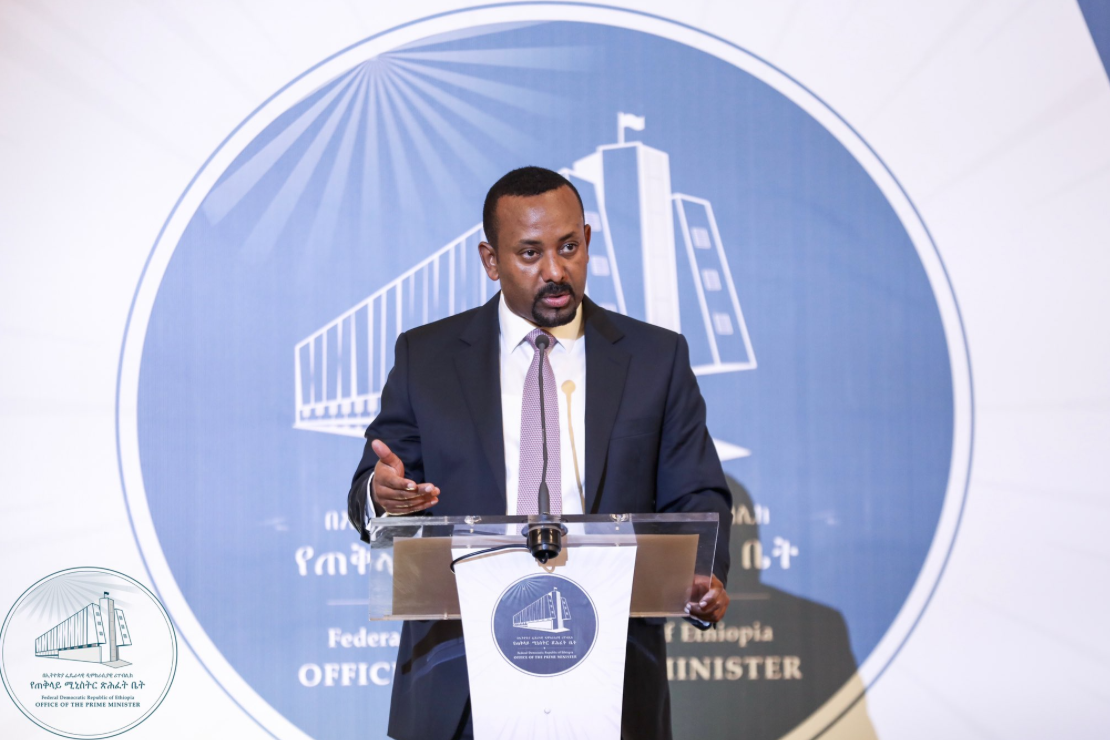
Commentaries | Dec 11,2021
Nov 6 , 2021.
Prime Minister Abiy Ahmed (PhD) stood to attention last week and saluted the high military brass during an event to remember the fallen soldiers of the Defence Force's Northern Command. It was the first year commemoration of what has come to be a protracted and bloody militarised conflict continued against armed forces from Tigray.
Ethiopia’s civil war started a year ago this past week. For the outside world, it has been intriguing. For those caught in the middle of it, the war has brought only devastation and unimaginable hardship. Ironically, it was begun with cheerleading of supporters on both sides of the conflict. For those keen on following the political development that led to the war, the shipwreck had inevitability.
Despite the determination by the federal government to carry out surgical military operations and get over the war quickly, the past year has proven to be a reality check. The war would be protracted, leading to political uncertainty, economic stagnation and social disruption of a massive scale. They say history does not simply repeat itself; it rhymes. It is as if the generation that lived through the dark times of the military-Marxist regime - the Dergue- has managed to reconstruct the events just in time for the next generation to suffer through it.
This war is a tragedy and unimaginable for a country already devastated by the combined forces of the COVID-19 public health crisis and economic slowdown.
But if there is a lesson from history, however rhythmic it may get, societies can pick themselves back up and continue for a better future if they are willing to learn from their past. There is no reason that Ethiopia today could not rise out of its current debacle and inaugurate a stable path. There is nothing about it that is unsalvageable. It is about having calm minds prevail.
There are many examples of this throughout the past decades. From Vietnam and South Africa to Rwanda, history shows how human ingenuity and spirit conquered different groups' insecurity about one another. They went on to build something worthwhile.
There is no better instance of this than Western Europe, which had a mix of states that saw the existence of one another through the prism of insecurity. For centuries, they fought bitterly but never succeeded in ridding themselves of the "existential threat" they saw in one another, including in what they called the Great War in the 1910s. They named it as such without anticipating that it would fade in comparison to far more brutal war in the 1940s in the form of World War II, the most destructive known to humankind.
It all seems strange today that France, Germany and the United Kingdom (UK) viewed one another with such fear and loathing, having since developed one of the closest military, economic and cultural alliances. Under an umbrella of rules and laws, they have found it within themselves to set in motion political and economic foundations that sees generations of their people as one of the most educated, healthy and prosperous in the world.
Ethiopia may not have had a similar story throughout its history. Repression and injustice have been rampant. It is a country of victors and the vanquished. Its peace captive.
Still, different groups have found it within each other to work and live together and intermarry. Some social groups have managed to coexist for thousands of years - together.
The main obstacle standing in their way now is that the public, the government and armed fighters have begun to resign to the notion that co-existence is impossible. It is a false notion. But, they are hunkering down for a long and difficult winter, having gradually given up on the possibility of peace. Such resignation and cynicism will ultimately be the undoing of the future of the next generation. Time is of the essence to address it.
The impetus for realising peace lies in examining the alternative in a sober mind.
A long and protracted war, or peace imposed through victory over an adversary, can only mean that the next generation of Ethiopians will grow poorly educated, malnourished, and without hope to thrive. It will be life denied of dignity. They will likely join security forces, militia groups and armed groups. This leads to a cycle of conflicts and poverty that Ethiopians must be familiar with by now.
The ongoing civil war is young, although its humanitarian destructiveness has been unprecedented. The social fabric is in shambles, and the damage that has been made to lives, livelihoods, and infrastructure is unimaginable.
There is yet a possibility to protect against total implosion, and that is by going forward with a plan that has yet to materialise, an all-inclusive engagement in good faith and sincerity. It is an overdue mission and a path that remains untried. The alternative has been disappointing.
The elites in Ethiopia have been addicted to the rhetoric of a "national dialogue" promised over the years. It has not materialised because they never realised a full-fledged political settlement that could serve as a framework for having one. For far too long, they have chosen the way of coercion instead of settling what are essentially political differences at the negotiating table. It should happen as urgently as possible.
The key to constructing the foundation upon which an all-inclusive engagement can happen is to establish lines of communication between the different actors. It requires a certain level of optimism that the other side will be level-headed to weigh options and choose a path of peace. It also needs leaders of all colours and stripes to be willing to compromise on their demands.
A productive negotiation is one where each side walks away from the deal unhappy but contented with the outcome. This can only happen if both sides can come to the negotiating table expecting a settlement more than the unfettered attainment of their demands. As always, the only firepower all parties require to make this a possibility is the courage in their convictions.
For these to happen, the guns must be quiet immediately. Armed hostilities need to cease and allow for full access to the humanitarian needs of the populations in the war zones. There has to be a truce for a ceasefire to let a more profound reflection take stock of what transpired over the gruesome past year. The war must be denied a second anniversarry.
PUBLISHED ON
Nov 06,2021 [ VOL
22 , NO
1123]

Commentaries | Dec 11,2021

Radar | Sep 08,2024

Radar | Nov 12,2022

Fortune News | Mar 23,2019

Featured | Nov 12,2022

Radar | Sep 06,2020

Commentaries | Aug 13,2022

Editorial | Jun 17,2020

My Opinion | Sep 06,2020

Commentaries | Dec 07,2024

Photo Gallery | 171621 Views | May 06,2019

Photo Gallery | 161860 Views | Apr 26,2019

Photo Gallery | 151600 Views | Oct 06,2021

My Opinion | 136311 Views | Aug 14,2021

Dec 22 , 2024 . By TIZITA SHEWAFERAW
Charged with transforming colossal state-owned enterprises into modern and competitiv...

Aug 18 , 2024 . By AKSAH ITALO
Although predictable Yonas Zerihun's job in the ride-hailing service is not immune to...

Jul 28 , 2024 . By TIZITA SHEWAFERAW
Unhabitual, perhaps too many, Samuel Gebreyohannes, 38, used to occasionally enjoy a couple of beers at breakfast. However, he recently swit...

Jul 13 , 2024 . By AKSAH ITALO
Investors who rely on tractors, trucks, and field vehicles for commuting, transporting commodities, and f...

Oct 5 , 2025 . By NAHOM AYELE
In Meqelle, a name long associated with industrial grit and regional pride is undergo...

Oct 5 , 2025 . By BEZAWIT HULUAGER
The federal government is set to roll out a new "motor vehicle circulation tax" in th...

Oct 5 , 2025 . By NAHOM AYELE
The Bank of Abyssinia is wrestling with the loss of a prime plot of land once leased...

Oct 5 , 2025 . By BEZAWIT HULUAGER
The Customs Commission has introduced new tariffs on a wide range of imported goods i...